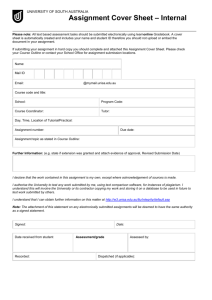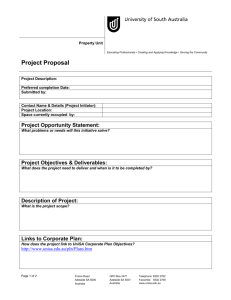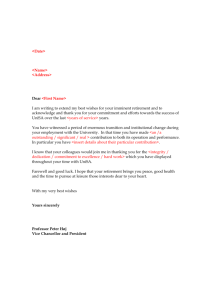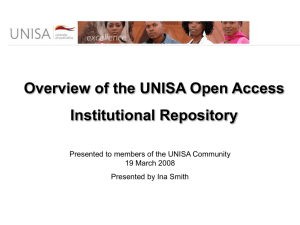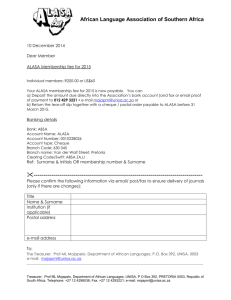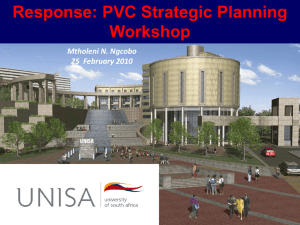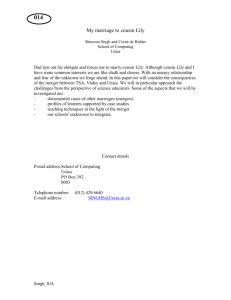The UNISA Open Data Institutional Repository Research cited more, safe forever*
advertisement
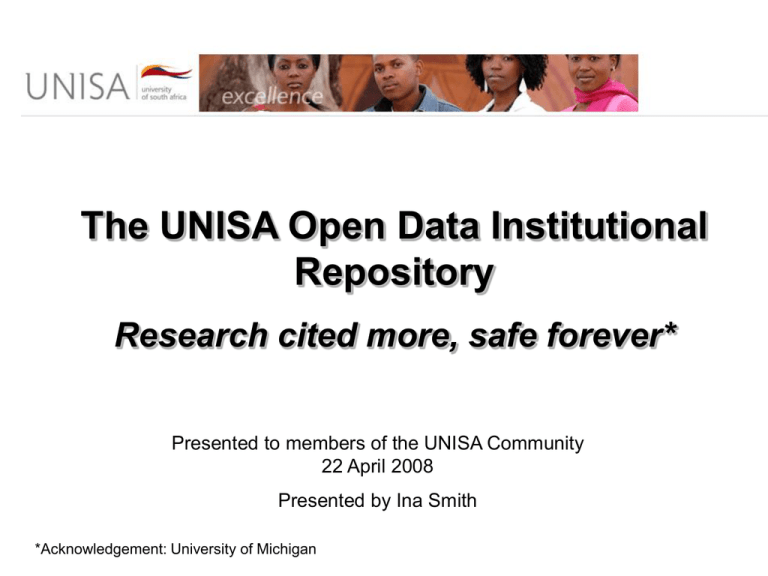
The UNISA Open Data Institutional Repository Research cited more, safe forever* Presented to members of the UNISA Community 22 April 2008 Presented by Ina Smith *Acknowledgement: University of Michigan Research @ UNISA “Be a leading research institution in South Africa” “Long term investment in the creation of new and improved knowledge and insights” “Unisa’s research policy is based on the principle of academic freedom – it encourages free and open intellectual inquiry and is a prerequisite for academic excellence” Objectives: “Enhance scholarly stature of the University” “Combination of research and community service is important” – transfer research to community “Disseminate research findings [in many forms e.g. reports, books, articles, media] – so that they may be confirmed, evaluated, applied by others – UNISA Research Policy www.unisa.ac.za Open access Two currents in OA movement: • OA self-archiving in institutional repositories (“green” road to OA) • OA publishing (“gold” road to OA – see e.g. DOAJ) “Open access (OA) is free, immediate, permanent, full-text, online access, for any user, web-wide, to digital scientific research and scholarly material.” Source: http://en.wikipedia.org/wiki/Open_access Open Data Addressed so far …. • • • • • Open access eCopyright Digitization Role of describers & Metadata Role of personal librarians Benefits of an open access IR • Research out quickly, worldwide • Increases visibility, usage, impact of research “open access papers are read more widely, and, therefore, cited more frequently. The consequence of this is that they have greater impact” (Jones, Andrew and MacColl 2006) • Open access to all – also those who cannot afford subscribing • Central archive of research • Persistent URL • Preservation function Benefits for personal librarians • • • • • • Easy to access Stay updated with regard to research conducted Encourages collaboration between faculty & Library Positions library within faculties & University Develop new skills Support researchers Impact an IR can have on research Research on IR Increased usage, impact Increase in citation rate Impact on NRF Rating etc. Shanghai University List 10 Repositories National 900 + Repositories International Univ. of Australia Cornell University And many more …. http://wiki.dspace.org/index.php/DspaceInstances University of St Andrews UNISA Champions • UnisaETD • Unisa Press • Unisa Art Gallery Implementing your IR (Timeline) 2007 - 2008 • Needs assessment • Evaluation of software • Proposal • Champions identified • Hardware & Staffing February/ March 2008 Deployment of IR on Developmental Server http://163.200.219.67:8080/dspace/ 6 March 2008 • Introduction & training • IR Project Manager April 2008 • Evaluation of IR on Developmental Server • IR Policy • Training Project Phases Analysis Design Development Implementation Evaluation DSpace Model (3 levels or more) Top-Level Community Faculty e.g. Economic and Management Sciences Sub-Community Department e.g. Accounting Graduate School of Business Leadership Submit items on Collection Level Collections E.g. Conference Papers/ Presentations Theses & Dissertations Chapters in Books Research Articles Research Reports Metadata Standards Digitization Standards UNISA DSpace Policy Policies & Standards Collection Policies Prior to submitting an item to DSpace 1. 2. 3. 4. 5. 6. Obtain permission (copyright clearance, letters of consent) Scan/ Digitize File format File naming convention Convert/ edit documents Add watermark/ header/ footer Intellectual Property Rights • Exclusive rights to the creative work, commercial symbol, or invention which is covered by it – remains with owner/creator • Permission obtained from rights holder • DC Element “Rights” – individual items • Copyright/ Rights note for Collection/ Community Copyright • Credit copyright holder for work • DC Element “Rights” – individual items • Copyright/ Rights note for Collection/ Community • Two approaches: – Publisher policy on SHERPA RoMEO – else; – Contact publisher directly and obtain permission – archive letter of consent on your IR Letters of Consent Licensing License stored with each item – Submitter grants license http://www.dspace.up.ac.za/defaultlicense.pdf “By submitting this license, you (the owner of the rights) grants to the University of Pretoria the non-exclusive right to reproduce, translate (as defined below), and/or distribute your submission (including the abstract) worldwide in print and electronic format and in any medium, including but not limited to audio or video.” Workflow Copyright Collection Administrators = Personal Librarians Digitization Submission Reviewing Metadata Editing Available on IR Role of Collection Administrator • • • • • • • • • • • • Market IR amongst departments Identify possible collections Liaise with department for assistance & support Register new collections Compile policy for collection Subscribe (stay updated & monitor workflow) Map from other collections to own collections Update collection home page from time to time Register submitters Monitor activity within collection Obtain permission when/where necessary Keep clients updated on new submissions Marketing the IR • Team effort by library staff • Visits to departments – lots of presentations – adapt according to their needs • Campus newsletter and other media, pamphlets • Collaborate with webmasters, research office, editors, publishers • Web page: About your IR • Communicate with clients via e-mails • Participate in events e.g. exhibits • Build interest in long-term preservation on campus • Register on the WWW Exposure on the WWW • • • • • Library Catalogue Web pages Search Engines (Google & Google Scholar) Metadata Harvesters IR Registries Library Catalogue Departmental Web Pages Automated Search Linking https://www.up.ac.za/dspace/handle/2263/1125//browse-title Research Report Hyperlink to full text version of publication Research Directorate Web Page Google Scholar Google “Africa as a knowledge society” IR Record Publisher’s Record Edit this page University of Pretoria institutional digital repository (UPSpace) on Wikipedia Electronic Visitor’s Book International Harvesters • • • • • • • DSpace http://www.dspace.org/ openDOAR http://www.opendoar.org/ ROAR http://roar.eprints.org/ Open Archives Institute http://www.openarchives.org OAISTER http://www.oaister.org/ DRIVER http://www.driver-repository.eu/ eIFL (SURFshare/ Driver) http://eifl.sharelab.cq2.org/en/page/page.view/eifl.page • Scopus & Scirus s.acker@elsevier.com • IRSpace http://www.google.com/coop/cse?cx=013518019117943 970829%3Atlw8-sayn_q DSpace 237 instances http://wiki.dspace.org/index.php//DspaceInstances Conferences E-Marketing Event Outcomes of your IR • New roles & responsibilities • Communities of practice (social networks) will be established • Knowledge transfer • Organizational learning • Change of mind-sets • Empowerment • Teamwork & collaboration • Management support In the words of Prof Jonathan Jansen … “This project has transformed my life as a Dean in three ways. First, it made me aware of the power of technology in managing the multiplicity of written tasks—media articles, media interviews, newspaper columns, intellectual pieces—that simply drift into spaces where I can never find these original writings. Second, it made me aware of the efficiency of dissemination of ideas in this information age if one simply took the time to create such a web space. Third, it made me aware of the power of collaboration between academic authors and the academic information services (library)— something that I had not explored until now. I am deeply grateful to the persistence of my academic library colleagues in opening up this new world in the life of a busy Dean” – Prof. Jonathan Jansen, former Dean of the Faculty of Education, University of Pretoria, Personal E-mail Communication, May 08, 2006. To conclude … “Inventing the future requires giving up control. No one with a compelling purpose and a great vision knows how it will be achieved. One has to be willing to follow an unknown path, allowing the road to take you where it will. Surprise, serendipity, uncertainty and the unexpected are guaranteed on the way to the future.” George Land, Breakpoint & Beyond Inquiries ina.smith@up.ac.za Tel.: +27 12 420 3082 Acknowledgement Ansie van der Westhuizen Judy Henning Dudu Nkosi UNISA IT Staff UNISA Library Management UP Colleagues Bibliography • Bluh, P. (2006). “Open access,” legal publishing, and online repositories. The journal of law, medicine & ethics, 34(1), 126-30. • Jones, R., Andrew, T. & MacColl, J. (2006). The institutional repository. Oxford, England: Chandos Publishing. • Lynch, C.A. (2003). Institutional repositories: essential infrastructure for scholarship in the digital age. ARL, 226, 1-7. Retrieved January 18, 2007, from http://www.arl.org/newsltr/226/ir.html • Paquette, M. (2005). Editorial: The public-access movement. Perspectives in psychiatric care, 41(1), 1.
